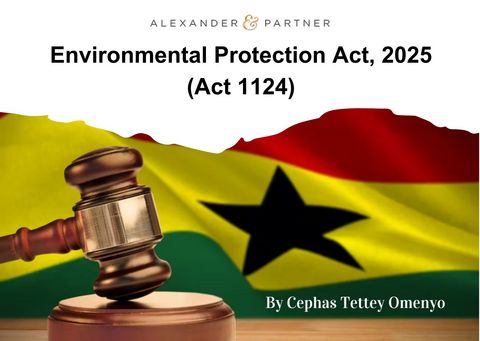GHANA’S NEW ENVIRONMENTAL PROTECTION LAW

In recent years, climate change, climate control, and environmental protection have emerged as critical global concerns, especially over the past decade. Nations around the world, including Ghana, have found it necessary to implement policies and initiatives aimed at improving environmental stewardship as part of a collective effort to address climate change and environmental degradation.
As a signatory to the United Nations Framework Convention on Climate Change (UNFCCC) and the Paris Agreement, Ghana has been compelled to align its national policies with international environmental commitments. In response, the country enacted the Environmental Protection Act, 2025 (Act 1124), which repeals and consolidates the Environmental Protection Agency Act, 1994 (Act 490) and the Hazardous and Electronic Waste Control and Management Act, 2016 (Act 917). This new legislation aims to comprehensively address contemporary environmental challenges in Ghana.
A key feature of the Act is the creation of the Environmental Protection Authority, which is vested with broad regulatory powers. Among its core functions is oversight of the Ghana Carbon Registry—a digital platform designed to track greenhouse gas emissions and facilitate carbon credit trading to bolster climate action efforts.
The Environmental Protection Authority is also mandated to:
• Prosecute environmental offenses and shut down businesses involved in environmentally damaging practices.
• Monitor and ensure compliance with Ghana’s international environmental obligations, including those under the Paris Agreement.
• Develop, implement, and enforce environmental management standards, as well as accredit environmental professionals.
• Publish the Environmental Bulletin to raise public awareness and educate citizens on environmental issues and developments.
The Act addresses urgent and emerging environmental concerns through several new provisions, including:
• Establishing a comprehensive pesticide control and management system that governs the formulation, production, storage, transport, use, and advertising of pesticides. It also provides for the creation of a Pesticide Management Fund to support these activities.
• Mandating the Authority to spearhead Ghana’s climate change strategies by integrating the country’s Nationally Determined Contributions into national legislation and managing carbon market activities via the Ghana Carbon Registry.
• Enforcing Ghana’s obligations under the Basel Convention by regulating the handling, transport, and management of hazardous waste, ensuring environmentally sound practices.
• Introducing the “Advanced Eco Levy” on certain electronic goods, requiring manufacturers and importers to register with the Authority and contribute to the levy to support responsible e-waste management.
Beyond the Pesticide Management Fund, the Act establishes three additional funds:
1. Electrical and Electronic Waste Management Fund – to support the collection, recycling, and disposal of electronic waste.
2. Mitigation Fund – to finance climate change mitigation projects and initiatives.
3. National Environment Fund – to support broader environmental protection and sustainability efforts.
To ensure accountability and encourage eco-conscious business practices, the Act empowers the Authority to develop a system for monitoring, evaluating, and rating companies based on their environmental performance. These ratings will be published to incentivize businesses to adopt greener production methods and enhance their public image.
By consolidating and updating Ghana’s environmental laws, the new Act places a stronger emphasis on climate action and environmental sustainability. Consequently, industries such as mining, oil and gas, and manufacturing will need to swiftly adapt their operations, waste management protocols, and environmental policies to meet upcoming regulatory standards aimed at making Ghana a more environmentally secure nation.
CEPHAS TETTEY OMENYO
Managing Attorney
Alexander & Partner Ghana PRUC


